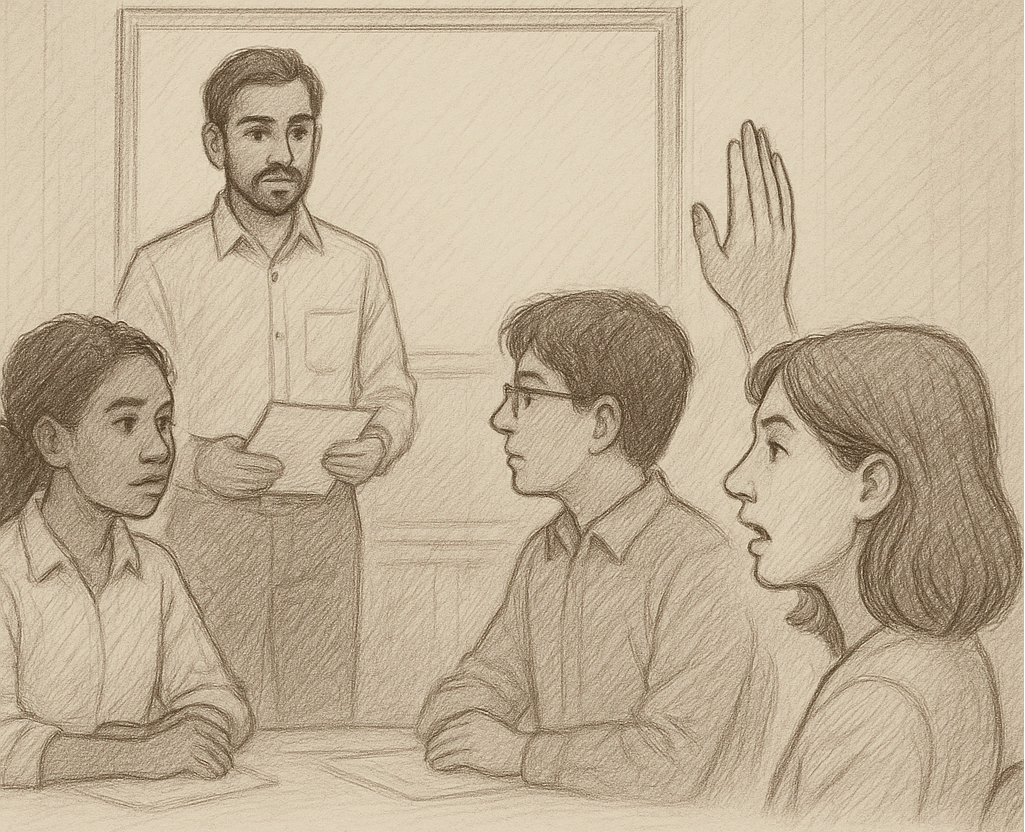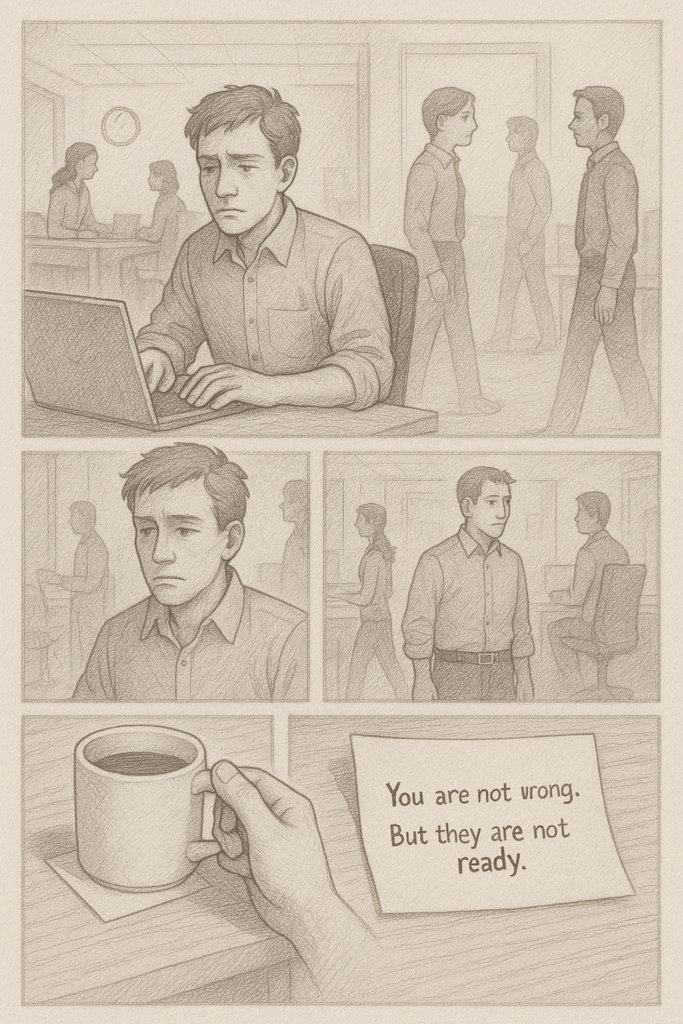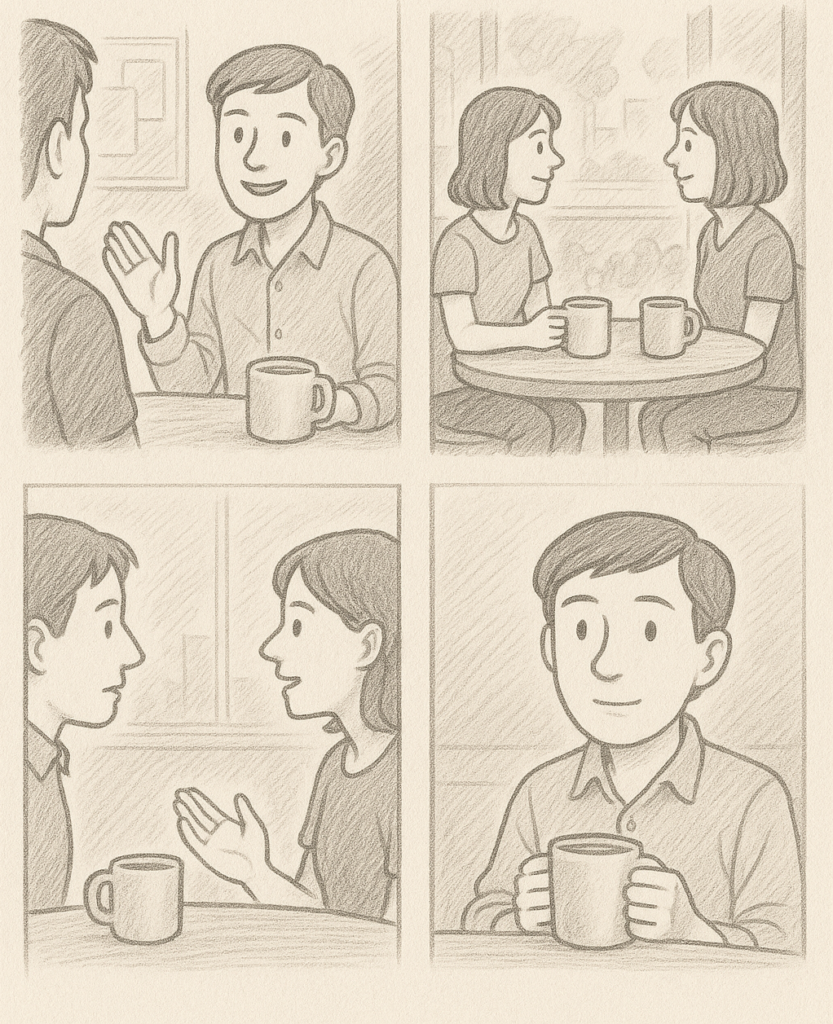I have a total of 10 years of experience, with 3 of those at Crest Systems.
When I joined here, I had this fire in me that I was going to lead the group into becoming the best it had ever been.
But right now?
The meetings are bland, dry. Can’t even say its awkward, just… practiced. Like everyone’s trained themselves to avoid saying anything real.
I’m not senior-senior, not sitting at the top, but as a mid-level manager, I care about how we show up for each other. Especially the quieter people in the room.

One day, during a review of our mentorship program, I raised my hand in the middle of Raj’s update and asked,
“Hey, why are all the mentors for engineering men? Didn’t we say we wanted this program to be inclusive?”
I asked it deliberately, hoping to bring some kind of spark, maybe encourage the women in the room to tune in.
But, to my surprise, no one argued and no one agreed either.

People just avoided eye contact. Someone shifted in their chair.
And just like that, the meeting moved on. Like I hadn’t said a single word.
Weeks passed. Regular tasks, more meetings, back-to-back calls… the usual corporate curse.
I didn’t bring the meeting up again. But I didn’t forget it either.
And I think people noticed my change in behavior.
Because one morning, I found a small note tucked under my coffee mug. It was written:
“You are not wrong. But they are not ready.”
No name, no clue who wrote it but it hit me hard.
I just stood there, holding the note, thinking, why, as a manager, with the power to bring out the best in my team, had I missed what was going on under the surface?
As a people’s manager, I’m the one who’s supposed to connect the pieces. Build something whole out of the individuals.
Bring in values and create, if not perfection, at least direction.
So I didn’t want to treat that note like a closed door.
I treated it like an invitation, not to war, exactly, but to something serious.
I started inviting team members out for coffee.
One-on-one, casual and no agenda.
Not to convince anyone and not to convince myself.
I just wanted to listen.
“What’s your experience here been like?”
“Is there something you care about but haven’t said out loud?”
“What’s one thing you wish the team understood better?”
Some conversations stayed surface-level, not surprising, as we had a pretty mixed bunch of people.
But some of them were, what to say, “Eye-opening”.
Raj, our senior dev, told me he avoids mentoring women because he’s scared.. scared of saying the wrong thing, of being misunderstood, of being labeled.
Tanya, who I had always assumed was just quiet, admitted she used to speak up until she kept getting interrupted or ignored.
Eventually, she just… stopped.
Luis said he agreed with a lot of what I had raised in meetings but after seeing one of our colleagues get sidelined for “pushing too hard,” by his peers, he promised himself he would stay neutral and enjoy the stability the job offers.

None of them were villains.
They were just people. Carrying fears, doubts, hopes, tucked beneath the public mask of “keep the peace.”
They were the peacekeepers.
After those conversations, I knew I had to shift something, not in them, but in how we operated as a group.
I stopped trying to be the first to speak in meetings.
Instead, I invited others in.
I started paying attention to timing… bringing up the real stuff during walks or over lunch, not in high-pressure meetings.
One day, during a conversation about promotions, I didn’t challenge anyone.
I just asked,
“Whose growth have we accidentally overlooked?”
And something clicked in them.
People leaned in.
Because when there is no personal loss or gain in the equation, humans are surprisingly generous.
Raj nominated a woman on his team for the next mentor cohort.
Tanya facilitated our next sprint planning call.
Luis, the quiet observer, actually backed a hiring change I had once suggested (and been ignored for).
It wasn’t a huge, dramatic turnaround.
There were no fireworks. No leadership emails praising “culture change.”
But the vibe in meetings? They started to feel different.
It became.. more open.
One day, a new teammate who just transferred from another section here and has always been a good friend, pulled me aside and asked,
“How did you do this? How did you make the team feel more… real?”
I smiled.
Thought about all those coffee chats.
The long pauses.
The anonymous note that started it all.
And I said,
“I stopped trying to win arguments, I started listening to what no one was saying.”
The writeup of mine that got me into framing this short story : https://ajayan.substack.com/p/one-shift-that-changed-how-i-handle?r=36ippk